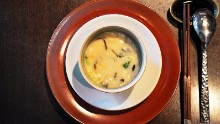
Photos: Best Hangzhou dishes
Boiled Song Sao "Auntie Song" fish soup – Best thing about 28 Hubin Road's Song Sao fish soup: It's uniquely delicious.
Worst thing: You can't eat it elsewhere.
"The traditional clear broth version focuses on getting a rich flavor but not a good texture," says Cheng.
Instead of using a thickening potato starch as the soup's base, its creaminess is a result of boiling down a large amount of snakehead fish for a long time before adding pieces of baked deep-sea cod (with a slightly crispy outer layer), vegetables and herbs.
The result is a sweet fish soup without a hint of fishiness.
Worst thing: You can't eat it elsewhere.
"The traditional clear broth version focuses on getting a rich flavor but not a good texture," says Cheng.
Instead of using a thickening potato starch as the soup's base, its creaminess is a result of boiling down a large amount of snakehead fish for a long time before adding pieces of baked deep-sea cod (with a slightly crispy outer layer), vegetables and herbs.
The result is a sweet fish soup without a hint of fishiness.
Hide Caption
8 of 13
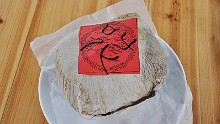
Photos: Best Hangzhou dishes
Beggar's chicken – Despite its humble name, beggar's chicken is often ordered for its showy theatrics.
It comes in a clay shell with a hammer. Diners break the clay with the hammer, resulting in a lot of action and photo ops. The chicken itself is stuffed with pork and mushrooms, wrapped in lotus leaf before being baked in clay.
It comes in a clay shell with a hammer. Diners break the clay with the hammer, resulting in a lot of action and photo ops. The chicken itself is stuffed with pork and mushrooms, wrapped in lotus leaf before being baked in clay.
Hide Caption
9 of 13
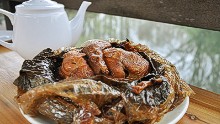
Photos: Best Hangzhou dishes
Beggar's chicken – The chicken itself is stuffed with pork and mushrooms, wrapped in lotus leaf and baked in clay.
Hide Caption
10 of 13
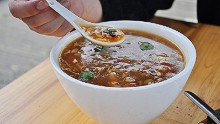
Photos: Best Hangzhou dishes
Beef and coriander soup, West Lake style – A traditional home-cooked dish, West Lake-style beef and coriander soup is said to get its name from its resemblance to the city's famous lake.
The thick potato starch base with egg white, mushrooms, coriander, beef and (sometimes) a bit of crab meat gives the soup the appearance of a rippling lake.
The thick potato starch base with egg white, mushrooms, coriander, beef and (sometimes) a bit of crab meat gives the soup the appearance of a rippling lake.
Hide Caption
11 of 13
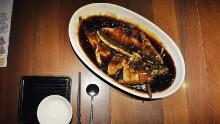
Photos: Best Hangzhou dishes
Grass carp in vinegar, West Lake style – It may not be the most photogenic dish but it's one of the stars of Hangbang cai cuisine. This Hangzhou dish uses poached grass carp blanketed with a thick, sweet vinegar sauce. Some may flinch at ordering this dish -- to achieve a desirable taste and texture (often said to be similar to crab), the grass carp has to be starved for a few days to expel unwanted waste from its body before being cooked. Lou Wai Lou has a grass carp trap in the lake next to the restaurant for this purpose.
Hide Caption
12 of 13
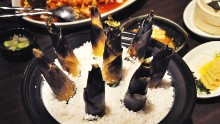
Photos: Best Hangzhou dishes
Spring bamboo shoot dumplings – 28 Hubin Road has a special seasonal menu featuring sticky rice wrapped in edible spring bamboo shoots filled with cured pork and kidney beans. The bamboo shoots are steamed in a pot of rock salt, which seasons the dumplings.
"Spring bamboo shoots are a Hangzhou specialty," says Cheng.
When eating the bamboo shoots, the harder outer layers are peeled until you find a tender edible layer, determined by the strength of your teeth.
"Spring bamboo shoots are a Hangzhou specialty," says Cheng.
When eating the bamboo shoots, the harder outer layers are peeled until you find a tender edible layer, determined by the strength of your teeth.
Hide Caption
13 of 13
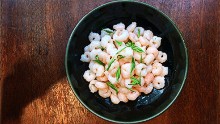
Photos: Best Hangzhou dishes
Longjing tea-fried river prawns – "Wok-fried Longjing (Dragon Well) tea with river prawns adopts something from the mountains and something from the water in Hangzhou," says Colin Cheng, chef at 28 Hubin Road. "It's the dish to represent Hangzhou."
Longjing is a mountain area where some of China's best tea leaves (also called Longjing) grow. West Lake is the most iconic attraction in Hangzhou.
The best version of the dish features whitish and crunchy river prawns with tea leaves sprinkled on top. Before frying the prawns, tea leaves are fried in the wok to bring a hint of tea to the dish.
Longjing is a mountain area where some of China's best tea leaves (also called Longjing) grow. West Lake is the most iconic attraction in Hangzhou.
The best version of the dish features whitish and crunchy river prawns with tea leaves sprinkled on top. Before frying the prawns, tea leaves are fried in the wok to bring a hint of tea to the dish.
Hide Caption
1 of 13
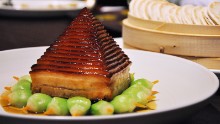
Photos: Best Hangzhou dishes
Jin pai kou rou (Dongpo pork pyramid) – Often considered a rustic dish, Dongpo pork gets an upgrade in the city.
At 28 Hubin Road, each pig is used to produce just six portions of pork belly, which are frozen before being sliced into 26 layers (in one continuous spiral cut). The meat is steamed for three hours, melting the fat and leaving the pork moist but not greasy. Smoked bamboo shoots are stuffed underneath, creating a pork pyramid. Diners sandwich a thin layer of pork and some bamboo shoots in a chestnut pancake.
At 28 Hubin Road, each pig is used to produce just six portions of pork belly, which are frozen before being sliced into 26 layers (in one continuous spiral cut). The meat is steamed for three hours, melting the fat and leaving the pork moist but not greasy. Smoked bamboo shoots are stuffed underneath, creating a pork pyramid. Diners sandwich a thin layer of pork and some bamboo shoots in a chestnut pancake.
Hide Caption
2 of 13
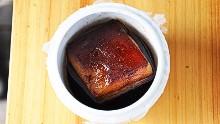
Photos: Best Hangzhou dishes
Dongpo pork – Dongpo pork is named after Su Dongpo, Hangzhou's beloved poet, painter and statesman (he lived about 1,000 years ago) who's said to have adored the comforting dish. Consisting of layers of lean and fat meat, thick slabs of pork belly are pan-fried, braised and often served with rice.
Dongpo pork was originally served in the pyramid style, similar to this version from Weizhuang Zhiweiguan restaurant.
Dongpo pork was originally served in the pyramid style, similar to this version from Weizhuang Zhiweiguan restaurant.
Hide Caption
3 of 13
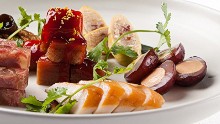
Photos: Best Hangzhou dishes
28 Hubin Road appetizer combination – This appetizer platter at 28 Hubin Road consists of three meat and three vegetarian options. Highlights include "eggs" that are actually marinated goose liver, red wine, peach compote and crystal trotters (a Hangzhounese cold cut).
Hide Caption
4 of 13
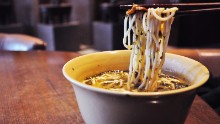
Photos: Best Hangzhou dishes
Pian'er chuan noodles – Created by the 158-year-old Kui Yuan Guan restaurant, this affordable noodle dish makes use of local ingredients, including bamboo shoots, preserved vegetables and small slices of pork.
Hide Caption
5 of 13
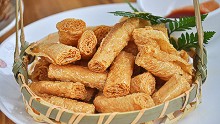
Photos: Best Hangzhou dishes
Deep-fried bean curd – A favorite Hangzhou snack, deep-fried bean curd roll is addictingly crispy. Some are packed with small bits of pork.
The snack is available all over China, but it's most famous here because bean curd is a specialty from Sixiang, Hangzhou. It usually comes with a sweet and sour dip.
The snack is available all over China, but it's most famous here because bean curd is a specialty from Sixiang, Hangzhou. It usually comes with a sweet and sour dip.
Hide Caption
6 of 13
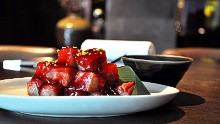
Photos: Best Hangzhou dishes
Osmanthus lotus root – Like candy, but healthier, these diced veggies with drizzled sweet red sauce are actually poached lotus root that's been filled with glutinous rice. A pinch of osmanthus plant is added for an extra kick.
Hide Caption
7 of 13

Photos: Best Hangzhou dishes
Boiled Song Sao "Auntie Song" fish soup – Best thing about 28 Hubin Road's Song Sao fish soup: It's uniquely delicious.
Worst thing: You can't eat it elsewhere.
"The traditional clear broth version focuses on getting a rich flavor but not a good texture," says Cheng.
Instead of using a thickening potato starch as the soup's base, its creaminess is a result of boiling down a large amount of snakehead fish for a long time before adding pieces of baked deep-sea cod (with a slightly crispy outer layer), vegetables and herbs.
The result is a sweet fish soup without a hint of fishiness.
Worst thing: You can't eat it elsewhere.
"The traditional clear broth version focuses on getting a rich flavor but not a good texture," says Cheng.
Instead of using a thickening potato starch as the soup's base, its creaminess is a result of boiling down a large amount of snakehead fish for a long time before adding pieces of baked deep-sea cod (with a slightly crispy outer layer), vegetables and herbs.
The result is a sweet fish soup without a hint of fishiness.
Hide Caption
8 of 13

Photos: Best Hangzhou dishes
Beggar's chicken – Despite its humble name, beggar's chicken is often ordered for its showy theatrics.
It comes in a clay shell with a hammer. Diners break the clay with the hammer, resulting in a lot of action and photo ops. The chicken itself is stuffed with pork and mushrooms, wrapped in lotus leaf before being baked in clay.
It comes in a clay shell with a hammer. Diners break the clay with the hammer, resulting in a lot of action and photo ops. The chicken itself is stuffed with pork and mushrooms, wrapped in lotus leaf before being baked in clay.
Hide Caption
9 of 13

Photos: Best Hangzhou dishes
Beggar's chicken – The chicken itself is stuffed with pork and mushrooms, wrapped in lotus leaf and baked in clay.
Hide Caption
10 of 13

Photos: Best Hangzhou dishes
Beef and coriander soup, West Lake style – A traditional home-cooked dish, West Lake-style beef and coriander soup is said to get its name from its resemblance to the city's famous lake.
The thick potato starch base with egg white, mushrooms, coriander, beef and (sometimes) a bit of crab meat gives the soup the appearance of a rippling lake.
The thick potato starch base with egg white, mushrooms, coriander, beef and (sometimes) a bit of crab meat gives the soup the appearance of a rippling lake.
Hide Caption
11 of 13

Photos: Best Hangzhou dishes
Grass carp in vinegar, West Lake style – It may not be the most photogenic dish but it's one of the stars of Hangbang cai cuisine. This Hangzhou dish uses poached grass carp blanketed with a thick, sweet vinegar sauce. Some may flinch at ordering this dish -- to achieve a desirable taste and texture (often said to be similar to crab), the grass carp has to be starved for a few days to expel unwanted waste from its body before being cooked. Lou Wai Lou has a grass carp trap in the lake next to the restaurant for this purpose.
Hide Caption
12 of 13

Photos: Best Hangzhou dishes
Spring bamboo shoot dumplings – 28 Hubin Road has a special seasonal menu featuring sticky rice wrapped in edible spring bamboo shoots filled with cured pork and kidney beans. The bamboo shoots are steamed in a pot of rock salt, which seasons the dumplings.
"Spring bamboo shoots are a Hangzhou specialty," says Cheng.
When eating the bamboo shoots, the harder outer layers are peeled until you find a tender edible layer, determined by the strength of your teeth.
"Spring bamboo shoots are a Hangzhou specialty," says Cheng.
When eating the bamboo shoots, the harder outer layers are peeled until you find a tender edible layer, determined by the strength of your teeth.
Hide Caption
13 of 13

Photos: Best Hangzhou dishes
Longjing tea-fried river prawns – "Wok-fried Longjing (Dragon Well) tea with river prawns adopts something from the mountains and something from the water in Hangzhou," says Colin Cheng, chef at 28 Hubin Road. "It's the dish to represent Hangzhou."
Longjing is a mountain area where some of China's best tea leaves (also called Longjing) grow. West Lake is the most iconic attraction in Hangzhou.
The best version of the dish features whitish and crunchy river prawns with tea leaves sprinkled on top. Before frying the prawns, tea leaves are fried in the wok to bring a hint of tea to the dish.
Longjing is a mountain area where some of China's best tea leaves (also called Longjing) grow. West Lake is the most iconic attraction in Hangzhou.
The best version of the dish features whitish and crunchy river prawns with tea leaves sprinkled on top. Before frying the prawns, tea leaves are fried in the wok to bring a hint of tea to the dish.
Hide Caption
1 of 13

Photos: Best Hangzhou dishes
Jin pai kou rou (Dongpo pork pyramid) – Often considered a rustic dish, Dongpo pork gets an upgrade in the city.
At 28 Hubin Road, each pig is used to produce just six portions of pork belly, which are frozen before being sliced into 26 layers (in one continuous spiral cut). The meat is steamed for three hours, melting the fat and leaving the pork moist but not greasy. Smoked bamboo shoots are stuffed underneath, creating a pork pyramid. Diners sandwich a thin layer of pork and some bamboo shoots in a chestnut pancake.
At 28 Hubin Road, each pig is used to produce just six portions of pork belly, which are frozen before being sliced into 26 layers (in one continuous spiral cut). The meat is steamed for three hours, melting the fat and leaving the pork moist but not greasy. Smoked bamboo shoots are stuffed underneath, creating a pork pyramid. Diners sandwich a thin layer of pork and some bamboo shoots in a chestnut pancake.
Hide Caption
2 of 13

Photos: Best Hangzhou dishes
Dongpo pork – Dongpo pork is named after Su Dongpo, Hangzhou's beloved poet, painter and statesman (he lived about 1,000 years ago) who's said to have adored the comforting dish. Consisting of layers of lean and fat meat, thick slabs of pork belly are pan-fried, braised and often served with rice.
Dongpo pork was originally served in the pyramid style, similar to this version from Weizhuang Zhiweiguan restaurant.
Dongpo pork was originally served in the pyramid style, similar to this version from Weizhuang Zhiweiguan restaurant.
Hide Caption
3 of 13

Photos: Best Hangzhou dishes
28 Hubin Road appetizer combination – This appetizer platter at 28 Hubin Road consists of three meat and three vegetarian options. Highlights include "eggs" that are actually marinated goose liver, red wine, peach compote and crystal trotters (a Hangzhounese cold cut).
Hide Caption
4 of 13

Photos: Best Hangzhou dishes
Pian'er chuan noodles – Created by the 158-year-old Kui Yuan Guan restaurant, this affordable noodle dish makes use of local ingredients, including bamboo shoots, preserved vegetables and small slices of pork.
Hide Caption
5 of 13

Photos: Best Hangzhou dishes
Deep-fried bean curd – A favorite Hangzhou snack, deep-fried bean curd roll is addictingly crispy. Some are packed with small bits of pork.
The snack is available all over China, but it's most famous here because bean curd is a specialty from Sixiang, Hangzhou. It usually comes with a sweet and sour dip.
The snack is available all over China, but it's most famous here because bean curd is a specialty from Sixiang, Hangzhou. It usually comes with a sweet and sour dip.
Hide Caption
6 of 13

Photos: Best Hangzhou dishes
Osmanthus lotus root – Like candy, but healthier, these diced veggies with drizzled sweet red sauce are actually poached lotus root that's been filled with glutinous rice. A pinch of osmanthus plant is added for an extra kick.
Hide Caption
7 of 13
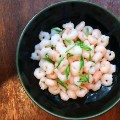
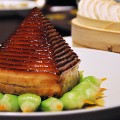
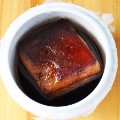
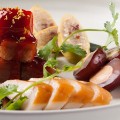
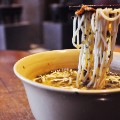
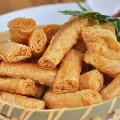
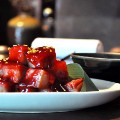
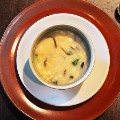
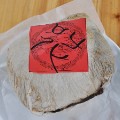
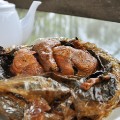
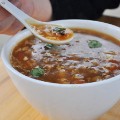
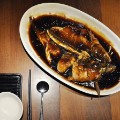
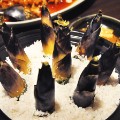
Hangzhou, China (CNN)"When the mail from San Pellegrino arrived for the first time, we ignored it," says Colin Cheng, one of the chefs behind 28 Hubin Road.
Cheng and his team thought the organization's invitation to attend its Asia's 50 Best Restaurants award ceremony in 2013 was a hoax.
Happily, it wasn't, and the restaurant has been a feature of the 50 best list for four years in a row.
Its success and global recognition is an indication of just how far the traditional cuisine of Hangzhou -- a major city in eastern China -- has come since receiving official recognition in the 1980s.
Specializing in local dishes, 28 Hubin Road, located in the Hyatt Regency Hangzhou, is the only restaurant in the city that made the list.
Nevertheless there's a thriving local food scene with many restaurants serving up great versions of recipes that remain some of China's best kept culinary secrets.
With Hangzhou now hosting the G20 Summit, the city's cuisine is under a brighter global spotlight than ever before.
Fortunately, visitors won't be disappointed.
The city's abundance of mountain-fed freshwater -- the same source that fills Hangzhou's famous West Lake -- is a key influence, providing plenty of fresh seasonal products.
"The biggest trait of Hangzhou cuisine (Hangbang cai) is the originality in flavor, which highlights the original taste of the ingredients self," says Cheng. "It requires delicate knife-work."
It's often mistaken for food cooked up in Shanghai, just a two-hour drive away, but Cheng insists there are essential differences.
"Hangbang cai is unique in a way that it combines influences from the north, like crab meat tofu, and the south, like dongpo pork," says Cheng.
"Hangbang cai is also milder in taste than Shanghai cuisine, which is often richer in seasoning and sweeter."
Check out the above gallery for a selection of essential Hangzhou dishes everyone should try.
Restaurants specializing in Hangzhou cuisine
28 Hubin Road (Hyatt Regency Hangzhou, 28 Hu Bin Road; +86 571 8779 1234-ext. 2828) is considered the best Hangzhou restaurant in the city. Its signature Dongpo pork pyramid requires ordering in advance.
Weizhuang Zhiweiguan (10-12 Yanggongti, Xihu District; +86 571 8797 0568) is a Hangzhou chain. The Yanggongti branch is the favored choice for many. It has an al fresco dining area in a garden setting. It's connected to six elegant ancient-style buildings (private dining rooms), linked to West Lake by meandering footbridges.
Hangzhou Restaurant (268 Yan'an Road, Xiacheng District; +86 571 8509 1717) is a century old. Popular among local foodies, it's earned a score of five stars (out of five stars) on China's crowd-sourced food review forum Dianping.
Lou Wai Lou (30 Gushan Road, Xihu District) is another old name in the city, with signature dishes like grass carp in vinegar (see gallery). The restaurant has lost some glamor in recent years with many diners finding the food hit-and-miss. But it has a prime location and the floating restaurant is good for diners wanting to view or tour West Lake.



No comments:
Post a Comment